AIRN Seminar #10
Emperor Muzura of the Maravi Empire and intensification of International Trade at Mankhamba
Yusuf M. Juwayeyi (Long Island University)
January 17, 2024 | Online | 6 PM (GMT)
Organization | African Ivory Research Network & Centre for History of the University of Lisbon
Zoom Meeting | https://videoconf-colibri.zoom.us/j/99204203201
Descarregar cartaz

Summary: Although Emperor Muzura is not mentioned in the oral traditions of the Chewa, more has been written about him than any other emperor of the Maravi. This is because his rule coincided with further Portuguese penetration of southern Africa, and the intensification of long-distance trade at Mankhamba, the capital of the Maravi Empire. The most important commodities traded were ivory and copper. In this presentation, I explore the evolution of this trade and how it helped raise Muzura’s profile and enlarged the Maravi Empire.
Yusuf M. Juwayeyi, Ph.D.
Associate Professor of Anthropology, Long Island University, Brooklyn, New York.
Yusuf Juwayeyi was born and raised in Malawi, south-east Africa. He obtained a Bachelor of Social Science degree in History and Sociology at the University of Malawi in 1973, and the Ph.D. degree in Anthropology at the University of California, Berkeley in 1981. Thereafter, he returned to Malawi to work as an Antiquities Officer in the Malawi Department of Antiquities where he rose to the position of Commissioner for Culture. In 2000, he was appointed Malawi’s Ambassador and Permanent Representative to the United Nations in New York.
Yusuf Juwayeyi has also served on two major international bodies. From 1995-1999, he was the Sector Contact Point for the sector of Culture, Information and Sports of the Southern African Development Community (SADC). From 1994-1997, he was the Africa President and World Vice President of UNESCO’s World Decade for Cultural Development.
In 2004, he accepted a tenure track position at Long Island University, Brooklyn, New York. He has carried out archaeological excavations at Stone Age and Iron Age sites in Malawi and has published results of his research widely. His major interests are prehistoric economies during the Later Stone Age and Iron Age periods. Recently, he has focused on the emergence of complex societies during the Iron Age period. His recent book, Archaeology and Oral Tradition in Malawi: Origins and Early History of the Chewa was published jointly by the University of Cape Town Press and James Currey of London in March 2020.
Recent publications:
2023. With Elizabeth Gomani Chindebvu, Louis L Jacobs, et. al. “The Mwesia Beds of Northern Malawi in Relation to the Tanganyika Problem.” Geological Society, London, Special Publications 543 (1).
2023. “The House with the Weird Animal: A Brief Account of the Establishment of Karonga and other Museums in Malawi.” In Yuong-Nam Lee. (Ed.) Windows into Sauropsid and Synapsid Evolution: Essays in Honor of Prof. Louis L. Jacobs. Dinosaur Science Center Press. South Korea.
2021. “The Early Inhabitants of Chiradzulo District, Malawi.” Society of Malawi Journal. 74 (3).
2021. “International Ivory Trade and the Expansion of the Maravi State in Northern Zambezia.” In Josè Silva Horta, Carlos Almeida, and Peter Mark. (Eds.) African Ivories in the Atlantic World/Marfins Africanos no Mundo Atlântico. Centre for History, University of Lisbon.
2020. Archaeology and Oral Tradition in Malawi: Origins and Early History of the Chewa. Cape Town: University of Cape Town Press.

